TRIBUTES TO TUTU AND MANDELA
AND STRUGGLE FOR
INDEPENDENCE, HUMAN RIGHTS, DEMOCRACY AND PLURALISM IN SOUTH AFRICA
Sachi G. Dastidar
(ISPaD: The Indian Subcontinent Partition Documentation Project)
Tutu Home in Soweto
Hearing the news of passing of the legend Rev. Desmond Tutu on Christmas Day 2021, it brought to memory of our efforts to pay tribute to him as well as to President Nelson Mandela, who brought independence, human rights to majority citizens, democracy as well as pluralism in post-apartheid South Africa. Fortunately, the nation remained undivided unlike in post-colonial India, and was able to give equal rights to all, majority and minority, unlike in one partitioned – now two parts, section of Colonial India.We went there after the passing of President Mandela.
For our connection to ISPaD – The Partition Documentation Center of New York, and Probini Foundation of New York which educates poor and orphaned in Bangladesh, and in Indian states of West Bengal, Assam and Mizoram, we were invited to meet with some South Africans.
As South Africa, and southern Africa, are wonderful places to visit, Shefali and I not only visited Johannesburg, the capital, and its former apartheid twin city of Soweto, home of both Rev. Tutu and Hon. Mandela, but also distant areas like Cape Town, Durban and more.
We visited wild Africa and wildlife parks as well.
On that trip we also visited Botswana, Namibia, and Lesotho. Those are wonderful places.
Johannesburg City
Visiting Johannesburg was a one-of-kind experience, It was an awe-inspiring city with its vastness and modern infrastructure comparable to any big city in Europe, America, or Australia. Our tour guide frequently reminded us that this is the only metropolitan city exists that does not sit on the banks of water. City existed because of gold mines, and water is transported from several hundreds of miles away. In many parts of the city long stretches of yellow soil on sides of the roads remind travelers of the existence of that gold mine-based economy. Although, it looked really wonderful, hotels and car drivers reminded tourists to return back before 5 pm in the afternoon to avoid annoyance. Even in downtown most of the shops closed immediately after office hour. However, almost all the hotels offered ride to malls, movies or shows that remained open in the evening. We enjoyed several plays with mixed performers.
Soweto was a sort ride from Johannesburg. We were able to visit the home of Nelson Mandela, which is a museum now, and stand next to Desmond Tutu’s home where his family still lives. Residents reminded us that this is the only street in the world where there are two Nobel laureates’ home. We also visited apartheid museums, shrines and parks reminding us of their past history – which is totally absent in India, Pakistan, and Bangladesh of foreign British colonialism, British-created apartheid, invasion by Islamic and European groups, and destruction of ancient shrines by foreign Arabic, Turkic, Persian, Portuguese and English speakers (as opposed to self-destruction by indigenous Hindu, Muslim, Sikh, Buddhist or atheist rulers, if any). These were eye opening to us. In South Africa, they have preserved sites of oppression by the British, and have saved many prisons as places to visit to remember their past history. How many prisons used by the British are preserved in India, Pakistan or Bangladesh? (Andaman Prison is an exception, see https://empireslastcasualty.blogspot.com/2018/07/andaman-islands-british-cellular-jail.html.) Luckily we were welcomed by strangers in many places, including by Africans followers in two ISKCON or Hare Krishna shrines in South Africa (as well as in Botswana.) We were invited to strangers’ homes for chats and tea, and in places for philosophical discourses by local African, White and Indian South Africans.
Another Museum
Cape Town is a beautiful city, and we chose a hotel near the port that took us to pay tribute to Nelson Mandela at Robben Island where he and other freedom fighters were exiled for years. The prison now serves as a museum and tourist attraction. Unfortunately for us at the very last minute the operators canceled the ferry because of possible storm surges. All of South Africa is a mixed society, especially her cities. There are museums to visit as well.
Cape Town
Another miracle happened to us as we were planning to visit Durban, the city associated with Gandhiji in his anti-colonial political introduction there. Gandhi was invited by laborers to defend them from British colonial oppression, and avoid the British-trap of Divide-and-Rule racist policy. Britain first tried in British India’s Bengal Province in 1905, then leader of the independence movement, by dividing the politically active pro-independence region into “Muslim” East Bengal and “Hindu” West Bengal when no Muslim or Hindu wanted such sectarian division, and then paying someone to start an anti-independence Muslim League Party. It was nice to see that South African activists were able to overcome such partition. In Durban, our miracle was meeting with monk Swamiji of New Jersey. I met Swamiji decades ago and he visited us at our home in New York at our schools in Bangladesh. Swamiji’s presence opened us to many local organizations, religious and secular, and to several local residents, workshops and forums. In Durban we visited the home where Gandhiji stayed, but now owned by a private family.
As tourists we also made trips to many sites, including museums and water parks. Even sitting in our Indian Ocean-front room in Durban gave us one of the best views of our trip.
From Durban we made a side trip to the mountainous nation of Lesotho, which is surrounded by South Africa. On our return journey, Ms. Jane, a Zulu lady from the local KwaZulu Natal Province, driver of our rented car took us to the infamous Pietermaritzburg Railway Station where Gandhiji was kicked out of the train in the middle of this trip for riding first class which was reserved for “Whites Only.” The waiting room is now a shrine with walls covering memorial tablets dedicated to Gandhi and South Africa.
Pietermaritzburg Station at Night, with Tributes Posted on Walls (Below)
Nelson Mandela (Below)



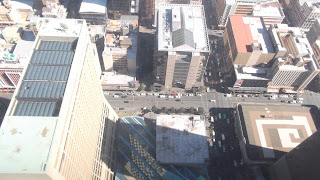












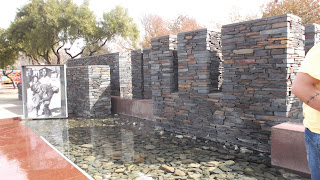



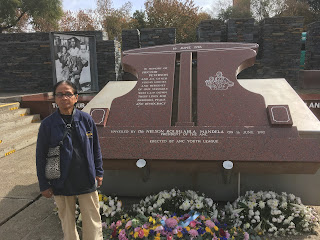

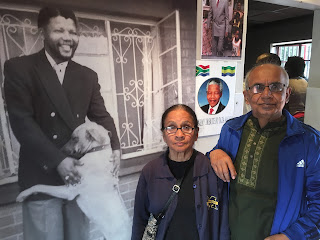



























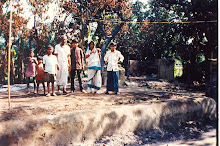
No comments:
Post a Comment